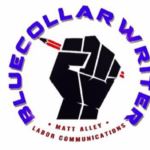
Editor’s note: This story was first published by Matt Alley in BlueCollarWriter Labor Media.
This Juneteenth, I want to take a moment to echo something powerful I saw on social media: a reminder from Appalshop about the often-overlooked diversity of Appalachia — and the long history behind it.
Appalshop, for those unfamiliar, is a legendary arts and cultural organization based in Whitesburg, Kentucky. Since 1969, it’s been a national leader in telling the stories of Appalachian people through film, music, community theater, radio, and archives. Their work centers working-class voices and uplifts the region’s complexity — not the stereotypes. They’ve earned respect from scholars, activists, and artists alike by preserving truth, telling hard stories with care, and resisting the forces that try to write us out of our own narrative.
And on Juneteenth, they made a simple but powerful statement: Appalachia has always been more diverse than people realize.
Let me localize my post a bit and echo that truth — because I’ve lived it.
I grew up on the Kentucky side of the Tug Fork River, right along the border with West Virginia. In places like this, especially where labor history runs deep, we grow up with a kind of shared statehood — a cultural and economic identity that transcends the boundary lines on a map. The same mountains, same mines, same music, same stories. And this photo below, taken in 1918 at the Lorado coal camp on Buffalo Creek in Logan County, WV, is a powerful reminder of why.
Here we see Black miners standing proud in their overalls and headlamps, tools in hand. These men weren’t just workers — they were builders of a region. They braved dangerous shafts, long shifts, and low wages. But they also stood shoulder to shoulder with immigrants, poor whites, and others in one of the most powerful labor struggles this country has ever seen.
Coal operators in West Virginia, Kentucky, and throughout the Appalachian coalfields thought they could use racism, bigotry, and prejudice as a weapon. They brought in Black laborers from the South to break strikes and divide the workforce. They separated housing. They paid differently. They counted on hate to keep miners from uniting.
But instead, something else happened.
Miners talked. They listened. They marched under one banner. And in time, many of them unionized together — Black, white, immigrant, native-born — finding common ground in the mines and in the fight for dignity, better wages, and safer conditions. It wasn’t perfect, and racism didn’t vanish, but the power of solidarity cracked the foundation of corporate control.
Let us not forget that history. Let us celebrate it — and make sure it remains part of the narrative every time we tell the story of this place we call home.
Juneteenth is not just a date. It’s a call — to remember the unfinished work of freedom, equality, and justice. It’s a call to honor the Black Americans who helped build not just the American economy, but the labor movement itself. It’s a call to lift up the stories that coal companies and power structures tried to bury — just like they buried the bodies of the workers they discarded.
Black history is Appalachian history.
Black labor is American labor.
And if we care about unions, about justice, and about truth — we’ve got to tell the full story.
Matt Alley,
BlueCollarWriter Labor Media
–
Find Matt on Instagram at: https://www.instagram.com/bluecollarwriter

